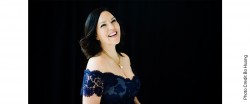 Imagine you got to know a house by groping in the dark, its curtains always drawn, no light switch, its shapes many and varied learned and remembered for night navigation only.
Imagine you got to know a house by groping in the dark, its curtains always drawn, no light switch, its shapes many and varied learned and remembered for night navigation only.
Then imagine somebody opening the curtains and letting a blast of sun in. It’s a very different house. We see, rather than infer, what it looks like. We experience more fully.
Such was the effect of hearing soprano Adrianne Pieczonka sing Schubert’s song cycle Winterreise February 12 in the Mazzoleni Masters Series with Rachel Andrist at the piano. Rendered in a powerful soprano voice with an unfailingly brilliant top and a magnificent Technicolor middle, the Winter Journey is a different trajectory indeed from what we’ve grown accustomed to in the company of baritones and tenors.
The opening Gute Nacht unfolded at a good pace: everything was clearer under the soprano light, the plodding rhythm of a walk through the snow, the wayward energy of the words. But then the key changed from minor to major before the final stanza. In regular rendition, it’s the moment of an infusion -- a brightening -- of sadness while the text begins to address the lost beloved directly. (“I don’t want to disturb your dreaming / It would be a shame to wake you” etc.) Here, it was so close and visible it felt as if a raw nerve were grazed. So this is how it’s going to be with a soprano, then? Good to know.
And so it continued. The second stanza in Der Lindenbaum, usually a moment of calm beauty, tugged at the tear reservoirs in Pieczonka’s rendition. Never was the fairly mundane “So manches liebe Wort” – the many words of love carved on a linden bark – floated and held to such effect. A bit later, the branches too rustled with unexpected intensity in “Und seine Zweige rauschten” verse and so did the entire stanza.
Rückblick, in tempo and mood a fairly manic evocation of the times of early acquaintance and of spring, suddenly breaks down at “Und ach, zwei Mädchenaugen glühten,” a cry of unbearable joy, or memory of joy that still overwhelms. In the following, sombre song, Irrlicht (Will o’ the Wisp) the last two verses which translate as “Every river finds its way to the ocean / and every sorrow to its grave” in Pieczonka’s hands become a mini scena. “Jeder Strom” starts very low and shoots up across the stave seeking its final destination up on high, followed by “auch sein Grab,” through the long, feline portamenti that make this inexorable direction of life almost bearable.
Der Wegweiser is delivered mostly softly, being an introspective moment where the poet, finding herself at the crossroads, wonders where to go. The törichtes in “Welch ein törichtes Verlangen” (“What is the foolish compulsion that drives me into desolation”) is a case of the famous Pieczonka high piano, the word here vibrating with a hidden sob.
When the light is on, details are clearer, and there were a number of times when I wondered if ornaments were added in certain places. Some of that is the effect of all the notes being made visible. In other cases, it is the honouring of the trills as they should be honoured: Frühlingstraum, (Dream of Spring), has trill suggestion written in on specific words like “Wonne” and “Seligkeit” (joy and delight, appropriately), and they were heard. In Der greise Kopf I thought I heard some masterful trilling in the last stanza on the “Kopf” and particularly “Greise” and went to the score after the concert; of course the markings are there.
Contrasts within the songs are also heightened with a soprano, and Wasserflut (Flood) could easily be an aria, clouds of anger flaring and subsiding across the bleak inner landscape. Der Leierman brought this atypical Winterreise to an equally atypical ending: the final stanza was whispered to the old man, almost flirtingly, certainly femininely and equally fearlessly, the question “Shall I go with you, will you play to my songs” given as the ultimate offering.
Rachel Andrist at the piano was a perfect partner in this macabre dance, playing as the score demands, sometimes against, sometimes alongside the voice. Her introductions and interludes offered as much in the way of text as the vocal parts themselves.
Let’s hope for a repeat of this sold-out concert, either in Toronto or on tour. More people deserve to hear it.



